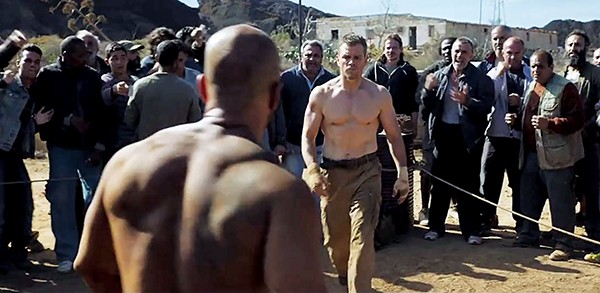I like Matt Damon; you like Matt Damon; everybody likes Matt Damon. He’s an everyman for our age. He can be vulnerable and nerdy, like when he’s playing the stranded astronaut in The Martian, or he can be rough and hunky, like when he’s playing Jason Bourne, like he does in Jason Bourne.
Author Robert Ludlum created Bourne in his 1980 novel The Bourne Identity, launching a surefire formula for airport gift-shop, page-turner success. He took a standard Cold War spy story of betrayal and double-cross and, borrowing a page from the Captain America comics, made his protagonist a borderline superhuman product of a covert CIA super soldier program. The now 13 books in the series all carry the same branding strategy: The title starts with “The Bourne…” and ends with a single, gravitas-inducing word like “Imperative,” “Ultimatum,” or “Sanction.”
For the fifth film installment of the Bourne saga, director Paul Greengrass and company have chosen to abandon the classic titular formula in favor of simply using the character’s name, and it’s a crucial tell. Even the modicum of creativity needed to take Bourne’s name and add a single, nondescript word was too much. Damon and Greengrass sat out the last installment, and 2012’s Bourne Legacy suffered greatly for its lack of Bourne, so now they’re back to give us the pure, uncut Bourne.
We first see our hero having an expositional flashback dream while riding in a crappy Land Rover to a godforsaken town on the border of Greece and Albania where he makes his living as a street fighter. Bourne prepares for the punch out with a resigned look, and I imagine Damon, having been sucked back in to play a part he said he was finished with, was drawing from life experience. In 2004’s The Bourne Supremacy, Damon’s expression read as the grim determination of a man who must survive long odds. In 2016, it vacillates between mild annoyance and boredom.
Also bored is Tommy Lee Jones as CIA Director Dewey. He’s secretly working to ensure that his spooks have access to all the information in Deep Dream, a poorly described tech product with 1.5 billion users created by Aaron Kalloor (Riz Ahmed). But Operation Iron Hand, Dewey’s plans for ushering in the surveillance state of his dreams, hits a bump when Kalloor gets an attack of conscience and opts out of the secret agreement he had with the government. Assassination plans are hatched.

Meanwhile, Bourne’s drawn out of hiding by Nicky Parsons (Julia Stiles), a former ally from back in the Ultimatum days who is going to leak word of all of the CIA’s nefarious doings to Christian Dassault (Vinzenz Kiefer), the Julian Assange hacker figure added to give outdated spy jinx a little 2016 razzmatazz. Greengrass creates the film’s only good set piece in the midst of a violent street protest in Athens where Bourne and Parsons are trying to meet while pursued by a fellow CIA superassissin known only as the Asset (Vincent Cassel). The dramatic lighting and crude street fighting suggest the 2014 made-for-YouTube protests in Ukraine, and the colorist has a field day.
But Greengrass can’t keep his bad habits at bay for long. The pioneer of handheld shaky cam just can’t sit still long enough to create a decent establishing shot. Either the film steadily loses visual coherence as it progresses, or I was just worn down by the constant useless cutting. Why does it take a team of film professionals five cuts to show Jason Bourne getting out of a car? Do we really need to see three angles of CIA Cyber Ops chief Heather Lee (Alcia Vikander padding her retirement account) doing hacker stuff on a laptop?
By the time Bourne and the Asset are chasing each other through the neon streets of Las Vegas, the crappy editing sinks the entire scene, transforming fantastically expensive car stunts into a dull blur of random images set to the same pounding, drum-heavy score that also accompanies Bourne when he’s heading into a hotel bathroom. Keeping with its generic title, Jason Bourne is the basic bitch of 21st-century action movies.
